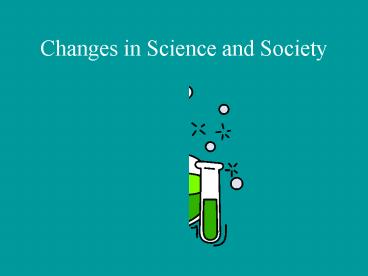Changes in Science and Society - PowerPoint PPT Presentation
1 / 14
Title:
Changes in Science and Society
Description:
From mid-16th century to end of 18th century. Aristotle's. Cosmology (geocentric) Nicolaus Copernicus, 1473-1543. Posited a heliocentric (sun-centered) cosmos ... – PowerPoint PPT presentation
Number of Views:24
Avg rating:3.0/5.0
Title: Changes in Science and Society
1
Changes in Science and Society
2
The Scientific Revolution
- A scientific revolution isnt like a political
revolution - Goes along with changes in philosophy, economic
theory, politics - From mid-16th century to end of 18th century
3
Aristotles Cosmology (geocentric)
4
Nicolaus Copernicus, 1473-1543
- Posited a heliocentric (sun-centered) cosmos
- Planets went around sun in circular orbits
- Didnt publish his thesis till year of his death,
1543 - His book banned by Church authority
5
Galileo Galilei, 1564-1642
- From Florence, Italy
- Used telescope to show that the moon was not
perfect and that Jupiter had moons - Tried as a heretic in 1633 and forced to recant
his theories
6
Whats important to note
- Each new thinker expands on the ideas of the
previous ones - Mathematics and experimentation become
increasingly important - Separation of science from the religious and
social values of the 16th-17th centuries - BUT science will begin to intersect with society
in unexpected ways
7
Isaac Newton, 1642-1727
- English
- Using math, ties together ideas of Galileo,
Kepler and Copernicus - Established idea that natural laws all work
together - clockwork universe
8
Science and Society
- The impact of new scientific ideas onto society,
religion and politics is called the
Enlightenment - The 18th century is Age of Enlightenment
- Characteristic movements
- Popularization (and simplification) of science
- Fashionable to be intellectual
9
The Culture of the Salon
10
The Salonnières
- Salon the living room
- From 17th to 19th century wealthy people,
especially women, entertain on intellectual
topics - General mixing of classes and discussion of
radical ideas - A place to see and be seen
11
The Social Enlightenment
- Sometimes involves strong understanding of
science and philosophy, sometimes just a surface
for show - Does encourage mixing of classes and some
prominence for women - Encourages a reassessment of traditional views of
the nature of human beings
12
The State of Man John Locke (1632-1704)
- All men have the ability to reason, even in
state of nature - Every man at his birth is a blank slate (tabula
rasa) upon which his society writes - Man is basically morally neutral
13
The State of Man Jean-Jacques Rousseau
(1712-1778)
- Origin of Inequality Among Men, 1753
- The Social Contract, 1762
- defines the General Will
14
What will shape the new society?
- If it is not God, is it the General Will? What
exactly is that? - If current governments are not serving the needs
of the populace, what kind of government will
serve them? - How do you replace one government with another?































